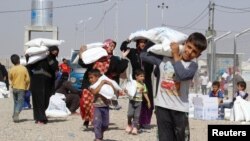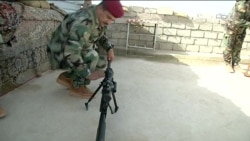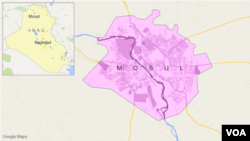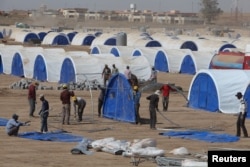The United Nations is bracing for what could be its biggest humanitarian challenge. As Iraqi and Kurdish forces move to liberate Iraq's second-largest city from Islamic State fighters, the U.N. said Monday as many as 1 million civilians could try to flee the fighting.
"Of the million, upward of 700,000 people would need some kind of shelter," U.N. Humanitarian Coordinator for Iraq Lise Grande told reporters on a video link from Baghdad.
"In a worst-case scenario, we would also expect of the 700,000 people, if there was lots of destruction in the city, they could be displaced for months on end," she added. She warned that if the U.N. and its partners had to care for that many people for an extended period, "then it would test us to the breaking point."
WATCH: Citizen of Mosul Fear Battle for City
The U.N. already is grossly underfunded for its Iraq humanitarian operation overall — and that was before Mosul.
Grande warned that civilians inside Mosul are at risk from various dangers.
"Our concern is that civilians are at extreme risk from crossfire, from possible artillery barrage. We understand that ISIL has booby trapped large parts of the city," she said, using an acronym for Islamic State.
Grande said they also are worried about snipers, civilians being used as human shields or IS forcibly expelling people from the city. She added that the possibility of a chemical weapons attack cannot be ruled out.
Safety of refugees
When Fallujah was liberated from IS in June, Grande said the Iraqi government established safe corridors through which to evacuate residents. It publicly announced where those corridors were, and IS attacked some of the routes.
She said this time there will be safe corridors, but their locations will quietly be made known to humanitarian supporters and others inside the city, to more safely evacuate residents.
Fear of violent reprisals by IS militants for daring to leave did not stop Ali Hussein, who described his 14-hour ordeal in an interview with VOA.
"We walked for hours in the minefields with no food or water," said Hussein, who is now at Garmawa refugee camp in northern Mosul.
Some families are so desperate to flee ahead of the military offensive that the price they are paying smugglers has skyrocketed. Reportedly, the cost a month ago for a family to flee was $1,500; it costs as much as $10,000 per person now.
"Anyone living under IS territory will try to escape at any price," Hussein added.
The U.N. hopes families will be able to remain in Mosul — but only as long as it is safe.
"If civilians feel that they need to go, they need to go safely across the front line into emergency areas where they can get assistance," Grande emphasized.
Assisting the displaced
Grande said there are six emergency sites operating that can accommodate 60,000 people. In the coming weeks, they hope to expand that to 22 sites that can shelter more than 400,000 people.
There are ready-to-eat food rations for 238,000 people, and 270,000 family food parcels that contain dry food rations. The Iraqi Red Crescent also is ready with more than 100,000 food parcels.
"We have a lot of confidence in the food pipeline; that's in very good shape," Grande said.
She urged people who do decide to leave Mosul not to move westward toward Tal Afar or Syria.
"The U.N. will not have access to those areas," she said.








